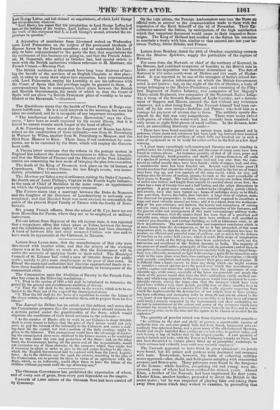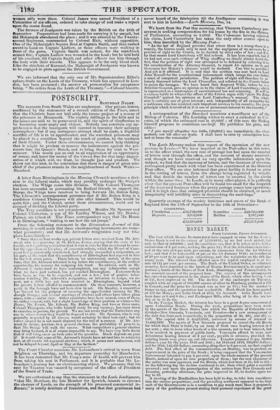Letters from Bombay, dated the 28th of October, containing extracts
from the Madras Spectator, supply the particulars of the capture Of Kurnoul.
For sonic time, the Nuwaub or chief of the territory of Kurnoul, in the Deccan, had exhibited symptoms of hostility to the British rule in
India ; and his deposition was therefore determined on. The fort of Kurnoul is 270 miles north-west of Madras and 120 south of Hyder- abad. It was reported to be one of the strongest of India's inland for-
tresses. The precise information on which the British Government acted is not known ; but, on the night of the 6th of October, a body of troops belonging to the Madras Presidency, and consisting of the Fifty- first Regiment of Native Infantry, two companies of her Majesty's Thirty-ninth Regiment, two companies of the Sixteenth Native Infan- try, a troop of the Seventh Regiment of Light Cavalry, and a detach- ment of Sappers and Miners, entered the fort without any resistance
whatever, not a shot being fired. The Nuwaub himself had been car- ried off by his own troops—Rohillas and Patens; who held him as a hostage for payment of arrears due to them. The artillery openly dis- played in the fort was very insignificant. There were many swivel wall-pieces, of which the wood-work had recently been repaired ; but only seven or eight field-pieces of small calibre. In the Zenana, how- ever, an astonishing discovery was made- " There have been found concealed in various ways, under ground and in godowns, whose doors and entrances had been built up, between four hundred and five hundred pieces of artillery, of which fully one hundred are in such a state of equipment as to be ready for active service in the field at a few days' ivarning. " A great many exceedingly well-constructed. furnaces are now standing in perfect order for casting guns and shot, and the ruins of many more have been tound in various places. An immense quantity of shot of all sizes, grape and canister, langridge, hand-grenades, and shells of various diameters, all made of a species of pewter, but containing more lead and less zinc than the coin- pound so called usually does have been found ; while of copper, lead, and zinc, a considerable store has been ferreted out. Several very fine brass guns (I should mention that almost the whole of the pieces found in the fort are of brass) have been dug up, and two mortars of the sann metal, which for size, and perhaps also for beauty of casting, promise to rank as the most remarkable of their genus in Europe. The bore of the largest is twenty-six inches, thickness of metal nine inches, and length from muzzle to cascabel about seven feet ; the other has a bore of twenty-two and a half inches, and the other dimensions in proportion. A great many muskets, musket-locks (English), pistols (ditto), and swords, have also been turned up ; heaps of cartridges ready to be filled; also port-fires, fuzees, fire-balls, slow matches, a large store of sulphur, rosin; tine charcoal for gunpowder ; in short, every material required to constitute a large and most valuable arsenal are here ; and it is evident, from the workman.; 'hip of his gun-carriages and limbers, the beauty and correctness of casting and (in many cases) boring of his guns, the construction of his furnaces, and the general order and arrangement of this most extraordinary military work shop and storehouse, that the master-land has been that of a practised and scientific man, whose subordinates insist have been artificers well qualified to conduct gun-founding and carriage-building, as well as laboratory work, in all their departments. The most remarkable and important conclusion which is at once drawn from the development, as far as it has proceeded, of this most stupendous plot, is, that the ann of the Nnwanb or his coadjutors has been to produce an efficient and powerful train of artillery, not so much for the defence of this flirt as for active field service, which it needs little scope of imagination to conclude would, at the fitting time, have been undertaken to work -out the subversion and overthrow of the British dynasty in India. The majority of time guns are of small calibre, principally of four and six pounders; and ot these in one godowu, the entrauces to which had been carefully built up, were found forty- four, very efficiently mounted on light fiehl-earriages, quite fit for immediate use; while in the same place were forty-two carriages ofa like description, evidently only recently completed, and ready to receive their guns and coats of paint. It is difficult front a hasty survey to form any thing which one might venture to consider a correct opinion as to the perioil over which this manufiteture of warlike engines and stores has extended: somne have the appearance of con- siderable age, while many, especially of the brass six-pounders and nearly the whole of thepewter round time shot, fro the little oxidization visible on their sur- face, and which long exposure to the atinor.phere would have proluced to a con- siderable extent, convey the impression that the furnaces which have been found have within a very short period, possibly two or three months, been in full operation and when we consider that this really .gigantic magazine, front which the imp'lements for the destruction of our empire were to have sprung, has been collecting and increasing daily in streluth and extent, alnmost ia the very heart of our dominions, in a manner so stealthy as to have been (of course until lately) scarcely suspected by the Government and their authorities, we are lost in astonishment at the extent and power of the resources which have furnished the means to dig so tremendous a mine beneath our feet, and in won- der and conjecture as to the time and the agents to be chosen or created for its explosion."
The quantity of powder seized was from 80,000 to 100,000 pounds-
" In addition to the shot rind shells of pewter, a considerable number of malleable iron six and nine pound balls had been found, hammereml into ex- ceedingly true spherical forms, and a great many of time old-tashioned Mantons, double and single barrelled flint fiwiiii-pieees and rides, in perfect order, and each having a bag of bullets tied to time trigger-guards. A vast quantity of musket-barrels and locks, with the Tower and Company's marks on them, had also been discovered in various places fitted up as gunsmiths' workshops, in which artisans had evidently been until very recently employed."
The Nuwaub appeared to have lived in great splendour : no jewels were found, but his palace and gardens were decorated and arranged with taste. Everywhere, however, his habit of collecting military stores appeared—shot, shells, and field-pieces mineliug with ornamental avenues and flower-pots. Many prisoners were found in the dungeons of the Zenana : whole families, comprising old and young, were dis- covered, some of whom had been confined for sixteen years. Ahmed Khan, a brother of the Nuwaub, had been imprisoned for four years. Khader Khan, another brother, pretended to direct the British to the secret stores ; but he was suspected of playing: false and taking them away from places which they wished to examine, by pretending that women otily were there. Colonel James was named President of a torninittee of six officers, ordered to take charge of and make a report upon the stores found.
The fortress of Joadpotire was taken by the British on the 28th of September. Preparations had been made for carrying it by assault, but the Maharajab tlbandoned the place ; and it was entered by the Twenty- second Regiment, commanded by Colonel Rich, without opposition. One of the Maharajah's Sepoys fired at Captain Smith, and then rushed sword in hand on Captain Ludlow, as those officers were walking in front of the gates. Captain Smith was unhurt, for the matchlock missed fire; Captain Ludlow was wounded in the head ; but he laid hold of his assailant, till Captain Smith and other officers ran him through the body with their swords. This appears to be the only blood shed. Like the chieftain of Kurnoul, the Maharajah of Joudpoore was known to be engaged in plots against the British Government.



























 Previous page
Previous page